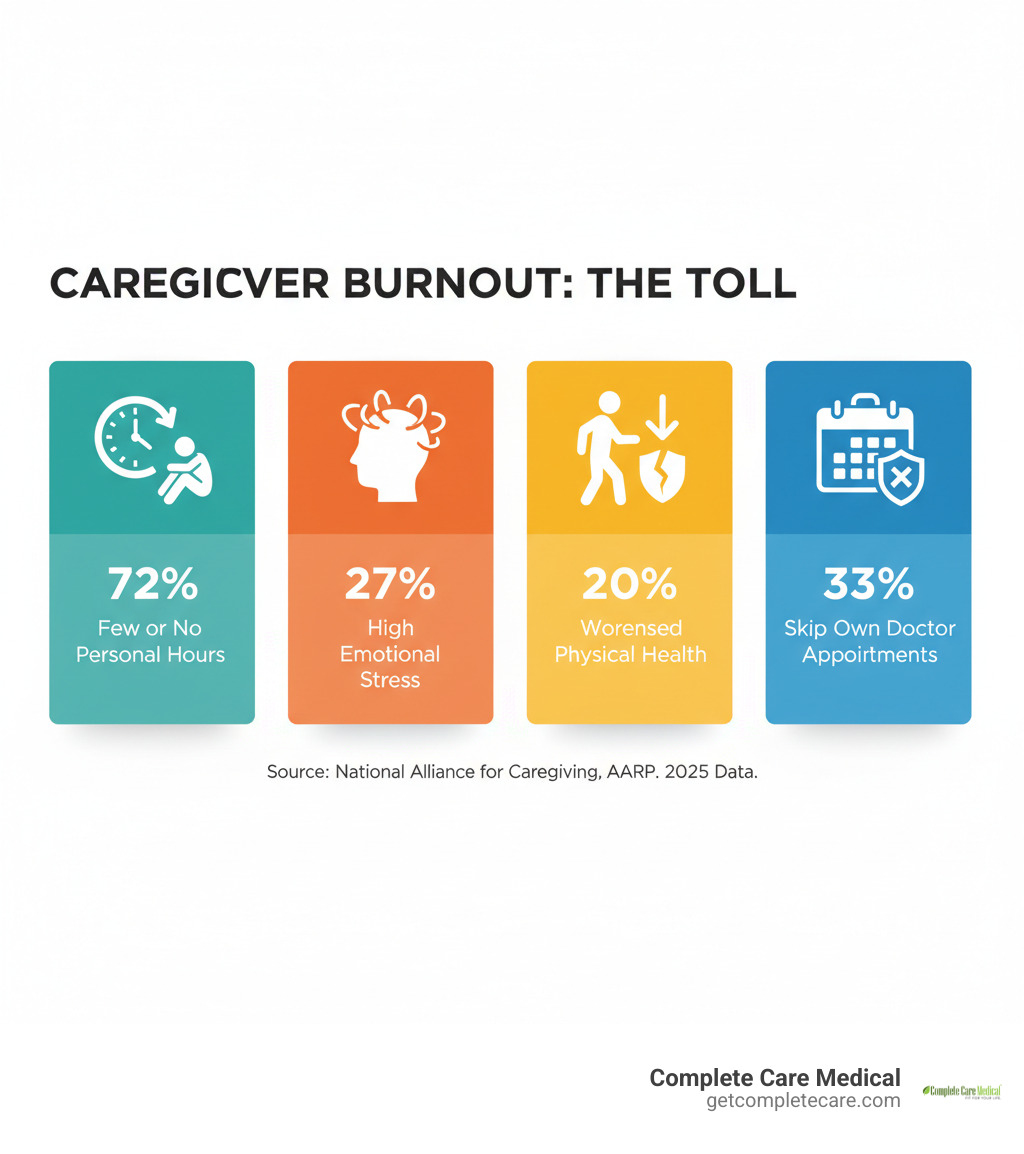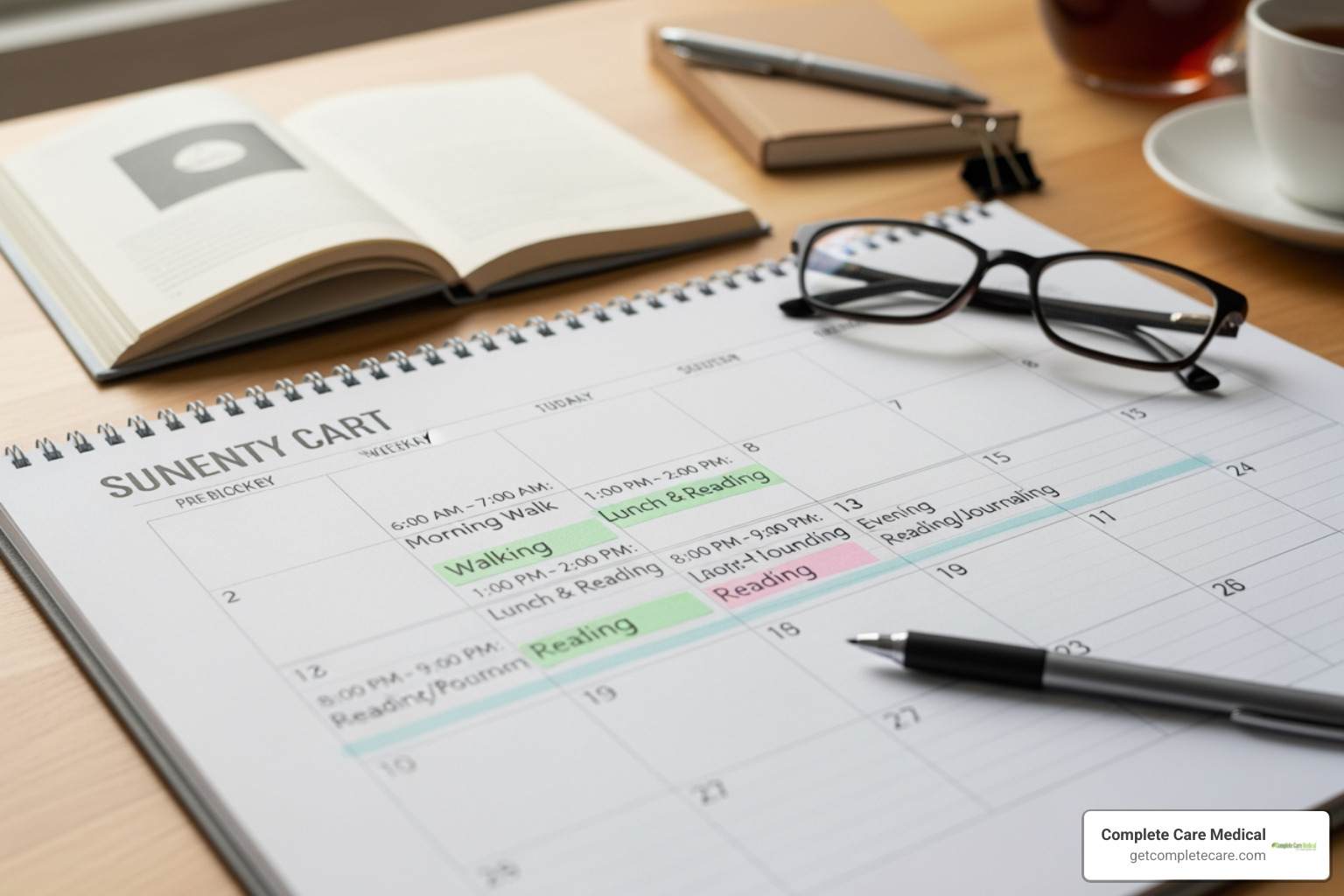Why Your Well-Being is Non-Negotiable
The Caregiver's Wellness Checklist: Don't Forget Yourself. If you're caring for a parent, partner or child, taking care of yourself is essential because neglecting your own health puts both you and your loved one at risk.
Quick Caregiver Wellness Essentials:
- Recognize burnout signs - fatigue, irritability, anxiety, sleep problems
- Prioritize physical health - exercise, nutrition, sleep, medical appointments
- Set realistic boundaries - say no, delegate tasks, schedule personal time
- Build your support network - join groups, use respite care, ask for help
- Practice daily self-care - even 10 minutes makes a difference
- Seek professional support - therapy, counseling, community services
- Remember: caring for yourself = better care for your loved one
Being a caregiver is rewarding, but it's also one of the hardest jobs. In the U.S., approximately 53 million adults provide unpaid care, and the toll is significant. Nearly 3 in 4 caregivers report having few or no hours for themselves, over 25% experience high emotional stress, 20% say their physical health has worsened, and 1 in 3 skip their own doctor's appointments.
You've heard the "oxygen mask" analogy—put yours on first. But in caregiving, there are no flashing lights. The truth is simple: your well-being directly impacts the quality of care you can provide. When you're exhausted, everyone suffers.
Supporting caregivers is just as important as providing medical supplies. This guide walks you through seven critical steps to protect your health. These aren't luxuries—they're necessities for sustainable caregiving.

The Caregiver's Wellness Checklist: Don't Forget Yourself
Acknowledge the Strain: Recognizing the Signs of Burnout
Caregiving is hard, and the emotional and physical toll can lead to burnout. More than 1 in 4 caregivers report high or very high emotional stress. The warning signs often start quietly. Be aware of:
- Constant Fatigue: A deep exhaustion that sleep doesn't fix.
- Irritability: Your patience wears thin over small annoyances.
- Sleep Problems: Lying awake with worry, even when exhausted.
- Feeling Overwhelmed: The to-do list feels endless.
- Anxiety and Depression: A constant sense of worry and loss of joy.
- Physical Symptoms: Frequent headaches, stomach issues, and getting sick often. About 20% of caregivers report that their physical health has worsened.
- Social Withdrawal: Feeling alone and disconnected from others.
These are not signs of weakness; they are normal responses to a demanding role. Acknowledging them is the first step toward taking action.

Prioritize Your Physical and Mental Health
Self-care isn't selfish; it's the fuel that keeps you going. Since one in three caregivers skip their own doctor's appointments, prioritizing your health is crucial. When you're healthier, you provide better care.
Here's how to prioritize your health when time is scarce:
- Physical Health: A 20-minute walk or stretching during commercials counts. Movement boosts mood and energy.
- Nutrition and Hydration: Opt for simple, nutritious meals and keep a water bottle nearby to fight fatigue.
- Sleep: Aim for 7-9 hours with a consistent bedtime routine.
- Mental Health: Carve out 15 minutes for something you enjoy, like mindfulness or listening to music.
- Medical Appointments: Do not skip your own appointments. Your health is just as important as your loved one's.
Set Boundaries and Ask for Help
Making time for yourself can feel difficult, but it's essential for sustainable caregiving. Give yourself permission to prioritize your needs.
- Set Realistic Goals: You can't do everything. Focus on small, manageable tasks to avoid feeling overwhelmed.
- Manage Your Time: Schedule breaks and self-care activities into your calendar.
- Learn to Say No: Acknowledging your limits is wisdom, not weakness. It's okay to say, "I can't right now."
- Delegate Tasks: Be specific when you ask for help. People often want to assist but don't know how. Ask, "Can you sit with Mom for two hours on Saturday?"

Build Your Support System
You weren't meant to do this alone. Building a support system is a critical part of your wellness plan.
- Connect with Peers: Join a support group, online or in-person, to connect with people who understand.
- Lean on Your Network: Be honest with friends and family about what you need. Sometimes just having someone listen provides enormous relief.
- Seek Professional Help: Therapy or counseling provides tools to cope with the emotional weight of caregiving.
- Use Community Resources: Look into services designed to lighten your load, such as respite care, adult day care, meal delivery programs, and home health aides.
Asking for help isn't weakness—it's wisdom.

Conclusion: Start Your Wellness Journey Today
Self-care is not a luxury; it's a necessity. Your health is connected to your loved one's. When you're rested and supported, you show up as a more patient, present, and capable caregiver.
What does starting small look like? It could be a ten-minute walk, scheduling a doctor's appointment, or calling a friend. One positive change today creates momentum. Give yourself permission to start where you are. Taking care of yourself ensures you'll be there for your loved one tomorrow, next month, and next year.
Here at Complete Care Medical, we've spent over thirty years supporting families. We know caregiving isn't just about medical supplies—though we're here to help with those, from urological catheters covered by insurance to wellness products that support your own health. We believe that when you are well, you can provide the best care possible.
Your caregiving journey is a marathon, not a sprint. Taking care of yourself doesn't diminish your dedication—it honors it. You're doing important work, and you deserve support. Take that first step today.



























































































